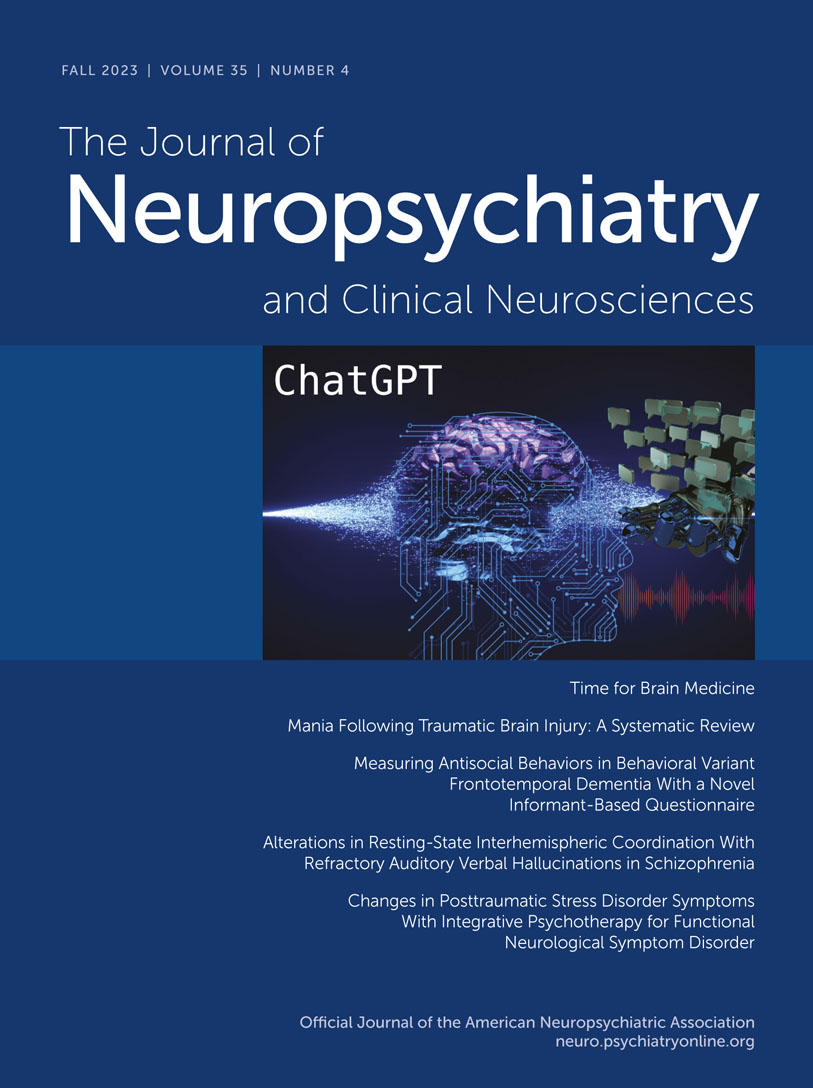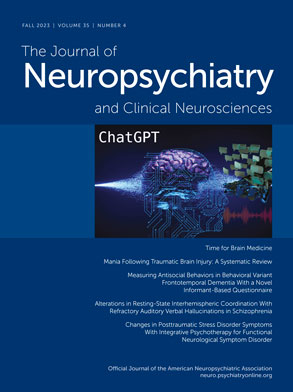Suicidal Thoughts and Behaviors in Anti-NMDA Receptor Encephalitis: Psychopathological Features and Clinical Outcomes
Abstract
Objective:
Methods:
Results:
Conclusions:
Methods
Design
Selection Criteria
Measures
Statistical Analysis
Results
General Features of the Sample
| Patient | Suicidal ideation | Suicide attempt | Self-directed violence during hospitalization | Follow-up |
|---|---|---|---|---|
| 1 | Suicidal ideation with intent and preparatory behavior | Absent | Present | Remitted |
| 2 | Suicidal ideation with intent and preparatory behavior | Medication overdose | Absent | Remitted |
| 3 | Suicidal ideation with intent | Present | Absent | Remitted |
| 4 | Suicidal ideation with intent | Absent | Absent | Remitted |
| 5 | Suicidal ideation with intent | Absent | Absent | Remitted |
| 6 | Suicidal ideation with intent | Absent | Absent | Remitted |
| 7 | Suicidal ideation with intent | Absent | Absent | Remitted |
| 8 | Suicidal ideation with intent | Absent | Absent | Remitted |
| 9 | Suicidal ideation with intent | Climbed to roof of her house and tried to jump | Absent | Remitted |
| 10 | Suicidal ideation with intent | Absent | Absent | Remitted |
| 11 | Suicidal ideation with intent | Absent | Absent | Remitted |
| 12 | Suicidal ideation with intent | Present | Present | Remitted |
| 13 | Suicidal ideation with intent | Tried to cut her wrists with a razor | Present | Persisted |
| 14 | Suicidal ideation with intent and preparatory behavior | Crossed avenues with heavy traffic; tried to shoot himself with a gun | Present | Remitted |
| 15 | Suicidal ideation with intent | Tried to jump from roof | Absent | Remitted |
Clinical Features of Patients With Suicidal Thoughts and Behaviors
Comparison of Patients With and Without Suicidality
| Variable | Patients with suicidality (N=15) | Patients without suicidality (N=105) | p | ||
|---|---|---|---|---|---|
| Median | Range | Median | Range | ||
| Age | 32 | 19–48 | 25 | 15–73 | 0.005 |
| Socioeconomic status | 2 | 1–4 | 2 | 1–5 | 0.435 |
| N | % | N | % | ||
| Female sex | 8 | 53 | 51 | 49 | 0.730 |
| Stable couple | 9 | 60 | 34 | 32 | 0.037 |
| Currently unemployed | 3 | 20 | 7 | 7 | 0.081 |
| Psychotic syndrome | 15 | 100 | 84 | 80 | 0.057 |
| Depressive syndrome | 10 | 67 | 11 | 10 | <0.001a |
| Delirium | 13 | 87 | 79 | 75 | 0.328 |
| Catatonia | 8 | 53 | 70 | 67 | 0.311 |
| Impulsivity | 13 | 87 | 45 | 43 | 0.001a |
| Insomnia | 15 | 100 | 66 | 63 | 0.004 |
| Seizures | 6 | 40 | 65 | 62 | 0.106 |
| Dyskinesia | 6 | 40 | 67 | 64 | 0.077 |
| Relapse | 5 | 33 | 12 | 11 | 0.023 |
Clinical Course of Patients With Suicidal Thoughts and Behaviors
Observations on Patient 13
Discussion
Suicidal Thoughts and Behaviors Are Not Uncommon in ANMDARE
Suicidality in ANMDARE Might Improve After Immunotherapy
Multicausality and Complexity of Suicidality in ANMDARE
Strict Screening Should Be Recommended Across the Stages of ANMDARE
Suicidality in Neurological Patients and Patients With Psychosis
Limitations of the Study
Conclusions
References
Information & Authors
Information
Published In
History
Keywords
Authors
Competing Interests
Metrics & Citations
Metrics
Citations
Export Citations
If you have the appropriate software installed, you can download article citation data to the citation manager of your choice. Simply select your manager software from the list below and click Download.
For more information or tips please see 'Downloading to a citation manager' in the Help menu.
View Options
View options
PDF/EPUB
View PDF/EPUBLogin options
Already a subscriber? Access your subscription through your login credentials or your institution for full access to this article.
Personal login Institutional Login Open Athens loginNot a subscriber?
PsychiatryOnline subscription options offer access to the DSM-5-TR® library, books, journals, CME, and patient resources. This all-in-one virtual library provides psychiatrists and mental health professionals with key resources for diagnosis, treatment, research, and professional development.
Need more help? PsychiatryOnline Customer Service may be reached by emailing [email protected] or by calling 800-368-5777 (in the U.S.) or 703-907-7322 (outside the U.S.).

